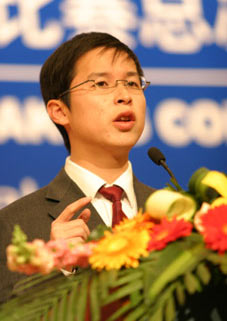| A Passion to Win in the Competition |
| http://www.sina.com.cn 2005/05/11 16:24 长喜欢乐英语 |
Thirty college students across the country attended the Tenth 21st Century Cup National English Speaking Contest in Beijing on April 10. Eventually, Xia Peng, from Nanjing University was named the champion. The second and third places went to Zhang Jing, a sophomore from China Foreign Affairs University, and Zhang A Xu, from Hong Kong Polytechnic University, respectively. More than 1000 college students in Beijing are lucky birds to listen to the speeches on the spot in Friendship Hotel. Just make to it the finals, they had to get past 60 others speaking on “The impact of globalization on traditional Chinese values”. That was at the semi-final on April 8-9. What will Chinese college students think about the impact? Each contestant had his own take on the subject. Xia summed up globalization by saying: “It’s just controversial and hard to say whether it is good or bad.” Xia took the old wall of his city, Nanjing, as a metaphor. He spoke about the conflict over whether to protect the old walls or tear them down to represent the conflict of ideas. He suggested that people protect the wall as a valuable relic while tearing down the “intangible walls” of their minds that prevent communication. While some other students are more focusing on the impact of globalization on family relations, attitudes towards love, and job-hunting. Over the past 10 years, the national English speaking competition has given contestants a chance to speak on a variety of topics closely related to their lives. Chinese students become more open-minded and receive various ideas and thinking over the decade. Diversity becomes more obvious on campus, students have more opportunities to express and show themselves. It’s not an easy task for the contestants to win through the fierce competition. Owning to their passion, hard work and persistence, they finally succeeded in the contest. Liu Xin, the first champion of the national contest, is now an anchorperson of CCTV-9. Recalling the passion of study on campus, she said: “When you want to express your idea by a foreign language without finding a right way, you’re really upset. Then you have to encourage yourself, and after a long term of bitterness, suddenly you find you get the right way with joy.” With the champion title in 21st Century Cup, Liu attended the International Public Speaking competition in London in May 1996 afterward and got the first prize historically.
The winner in 2003 surprised the audience, since she came from accounting major instead of English major. Gu Qiubei, then 22 years old, was a senior in Shanghai Foreign Studies University. While being asked whether she had some good methods to learn English, she said: “Learn English with passion and enthusiasm.” Attracted by the greatness of English language, Gu even changed her major from accounting to English in her postgraduate study. The most important issue in English learning process she pointed out is personal interests. Only people interested in English benefit a lot from the learning methods and those with passion will finally achieve their dreams. When chief of global media giant Viacom Sumner Redstone gave a speech in Tsinghua University on his autobiography A Passion to Win, he was asked what made him to restart his career at the age of 60, the 81-year-old media tycoon said: “Firstly, there’s a self-driving force in my deep heart, which keeps my passion to succeed and surpass others; secondly, I don’t think I’m too old to leave work, actually I love my work very much.” Some of the contestants have achieved their dreams as Redstone; still others are on the way to their dream. With a passion to win, you will overcome obstacles and succeed at the end. By the first prize winner, Xia Peng, Nanjing University: 第十届“21世纪杯”全国英语演讲比赛冠军演讲稿 Building Bridges for the Future I’m studying in a city that’s famous for its walls. People who visit my city are amazed at the imposing sight of its walls, especially when silhouetted against the setting sun with gold, shining streaks. The old, cracked bricks are covered with lichens and the walls are weather-beaten guards standing still for centuries. Our ancestors liked to build walls. They built walls in Beijing, Xi’an, Nanjing and many other cities, and they built the Great Wall, which snakes across half our country. They built walls to protect against enemies and evil spirits. This tradition has survived to this day: we still have many parks and schools walled off from the public. For a long time, walls were one of the most natural things in the world to me. My perceptions, however, changed after I made a hiking trip to the eastern suburbs of my city. My classmates and I were walking with some foreign students. As we walked out of the city, we found ourselves flanked by tall trees, which formed a wide canopy above our heads. Suddenly one foreign student asked me, “Where is the entrance to the eastern suburbs?” “We’re already in the eastern suburbs,” I replied. He seemed taken aback, “I thought you Chinese had walls for everything.” His remark set off a heated debate. At one point, he likened our walled cities to “jails”, while I insisted that the eastern suburbs were one of the many places in China that had no walls. That debate had no winners, but I did learn a lot from this student. For instance, he told me that some major universities like Oxford and Cambridge were not surrounded by walls. I have to admit that we do have many walls in China, and as we develop our country, we must look carefully at them and decide whether they are physical or intangible. We will keep some walls but tear down those that impede our development. Let me give another example. A year ago, when I was working on a term paper, I needed a book on business law and found a copy in the law school library. However, the librarian coldly rejected my request to borrow it, saying, “You can’t borrow this book, you’re not a student here.” In the end, I had to spend 200 yuan to buy a copy. Meanwhile, the copy in the law school gathered dust on the shelf. At the beginning of this semester, I heard that my university had started to think of unifying its libraries and linking them to libraries at other universities, so my experience wouldn’t be repeated. Barriers would be replaced by bridges. An inter-library loan system would give us access to books from any library. With globalization and China integrated into the world, I believe many of these intangible walls will be knocked down. I know that globalization is a controversial issue, and it is hard to say whether it is good or bad. But one thing is for sure: it draws our attention to China’s tangible and intangible walls and forces us to examine their role in the modern world. And how about the ancient walls of mine and other cities? Should we tear them down? Definitely not. My city, like Beijing and other cities, is actually making a great effort to preserve the walls. These walls attract historians, archaeologists, and many schoolchildren who are trying to study our history and cultural heritage. Walls have become bridges to our past and to the rest of the world. If the ancient builders of these walls were still alive today, they would be proud to see such great changes in the role of their walls. They are now bridges that link East and West, South and North, and all countries of the world. Our cultural heritage will survive globalization. |
| 赢的激情--记英语演讲比赛的获奖者们 |
4月10日,来自全国各地高校的30位大学生齐聚北京,参加了第十届21世纪杯全国英语演讲比赛。最终,来自南京大学的夏鹏获得了比赛的冠军。第二名和第三名分别被来自中国外交学院的张京和来自香港理工大学的张阿旭获得。在北京的1,000多名大学生有幸到友谊宾馆观看了现场的比赛。 在4月8-9日的半决赛中,这些选手淘汰了其他60名选手,最终进入了总决赛。演讲的主题是“全球化对中国传统价值观的影响”。中国的大学生对这种影响有哪些看法呢?每位选手对这个问题都有自己的看法。对于全球化,夏鹏总结说:“这个问题充满了争议,很难说它到底是好还是坏。”夏鹏拿他的家乡——南京的古城墙来作比喻。他通过谈论保护与拆毁古城墙之间的矛盾,显示了这两种观念之间的冲突。他认为人们应该将古城墙作为珍贵的遗产进行保护,同时要拆掉心中妨碍沟通的那堵“无形的墙”。而有的选手则更加关注全球化对家庭成员的关系、对待爱情的观点,以及求职等方面的影响。 在过去的10年里,全国英语演讲比赛为参赛选手提供了畅所欲言的机会,使他们可以对与生活息息相关的各种问题发表自己的观点。中国学生的思想更加开放,他们接受了各种思想,对时代进行思考。校园里的多元化愈加明显,学生也有更多的机会表达和展示自己。众多选手要在如此激烈的竞争中胜出并非易事。凭借自己的热情、努力和毅力,他们最终在比赛中胜出。 刘欣是第一届全国比赛的冠军,现在是中央电视台国际频道的一位新闻节目主持人。在回忆校园学习的热情时,她说:“当你希望用一种外语表达自己的想法,却找不到正确的方式时,你会非常心烦意乱。这时,你要不断给自己打气,经过一段时间的努力之后,你会突然发现自己找到了正确的方式。”在获得21世纪杯英语演讲比赛冠军之后,刘欣又参加了1996年5月份的伦敦国际演讲比赛,并历史性的获得了冠军。 2003年的冠军却让观众大吃一惊,因为她学的是会计专业,而非英语专业。当时22岁的顾秋蓓是上海外国语大学的一名大四学生。当被问及她有什么学习英语的好方法时,她说:“学习英语要有激情和积极性。”顾秋蓓被英语这门语言的魅力所吸引,她甚至将自己的研究生专业从会计转到了英语专业。她指出在英语学习过程中关键问题是个人的兴趣。只有对英语感兴趣的人才能从学习方法中受益,也只有那些对英语有热情的人才能最终实现自己的梦想。 全球媒体巨头维亚康姆的总裁雷石东在清华大学为他的自传《赢的激情》发表演说时,有人问他是什么动力驱使他在接近60岁的高龄,进行再次创业的?这位81岁的媒体巨头表示:“首先,我这个人内心向来有一种自我驱动力。它促使我不断地挑战自我,保持积极取胜、超越别人的激情。第二,我觉得我的心态根本没有老,我非常喜爱我从事的工作。” 其中有些参赛者像雷石东一样实现了他们的梦想,其他人也正在追寻自己的梦想。拥有赢的激情,你就能克服困难,最终取得成功!(编译:李强) |
| 【评论】【论坛】【收藏此页】【大 中 小】【多种方式看新闻】【下载点点通】【打印】【关闭】 |

